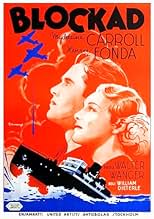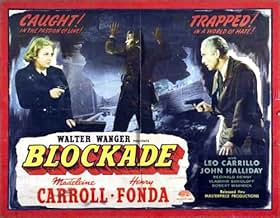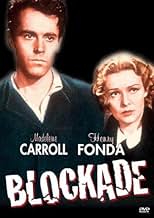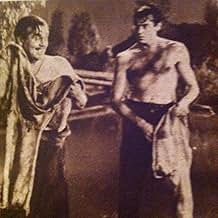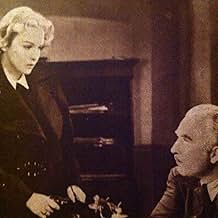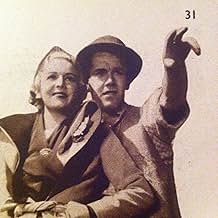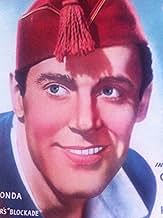Agrega una trama en tu idiomaA simple peasant is forced to take up arms to defend his farm during the Spanish Civil War. Along the way he falls in love with Russian whose father is involved in espionage.A simple peasant is forced to take up arms to defend his farm during the Spanish Civil War. Along the way he falls in love with Russian whose father is involved in espionage.A simple peasant is forced to take up arms to defend his farm during the Spanish Civil War. Along the way he falls in love with Russian whose father is involved in espionage.
- Dirección
- Guionistas
- Elenco
- Nominado a 2 premios Óscar
- 3 premios ganados y 2 nominaciones en total
- Pietro
- (as Fred Kohler Sr.)
- Commandant
- (as Wm. B. Davidson)
- Cabaret Singer
- (as George Byron)
- Townswoman
- (sin créditos)
- Dirección
- Guionistas
- Todo el elenco y el equipo
- Producción, taquilla y más en IMDbPro
Opiniones destacadas
Boasting the tagline 'the most important film of 1938' and having been awarded Oscars at the time of its release, I decided to watch this film and see what the fuss was about. What I found was a film that is too self-consciously cautious to be great fun, too worthy to be involving and ends up being rather dull and uninteresting. The basic plot is set around the Spanish civil war but it appears to have been careful about coming down on either side of the argument and therefore is so balanced that it almost cancels out any content that may have been challenging or informative. This leaves a story about personalities and the central romance, which is a problem because the film doesn't deal with these very well either. The romance tries to be bleak and supposedly doomed but it just can't get the tone right and it never really gets anywhere near as emotive as it needed to be certainly this is no Casablanca.
With the script problems and rather drab direction, the film only occasionally gets close to being really impacting and involving and it was only the moments where the horrors of the conflict are allowed to get above political neutrality that the film comes to life but these are too infrequent. The cast are set adrift and do the best they can to squeeze emotion and drama out of the script but their efforts just seem out of place against a rather flat backdrop. Fonda is always watchable even if his 'good honest man' is a rather dull character and, for that reason, hard to get behind; certainly modern audiences may find his unquestioning patriotism and simple morals hard to swallow. Carroll is better than the film deserves, her performance is very good and it is just a shame that the rest of the film doesn't come up to her level of work. Support is OK but the script doesn't fill the film that well and most of the cast are given little to do.
Overall this may well have been the 'most important film of 1938' but it doesn't do a great deal today. The film doesn't inform and isn't interesting as it carefully treads the complexities of the conflict and Fonda's final to-camera rant about peace is too little, too late and just comes across as being rather pat. The romance could have saved it but this too is fluffed despite the best efforts of Carroll, but Fonda, despite being worth a look, plays it all to simplistically in line with the material.
Sooner the Spanish Civil War begins and Marco leads a group of peasants to defend Castelmare and he is assigned lieutenant of the rebels' army. Meanwhile, Basil and Norma are forced to spy for Andre Gallinet (John Halliday). Marco suspects of Basil and follows him to his room. When Basil reacts, Marco kills him in a shooting.
Meanwhile, Castelmare is under siege and without supplies, and Norma escapes from Marco. But she is blackmailed by Gallibet and forced to return to Castelmare with information about the ship that is bringing supplies for the population.
"Blockade" is a shallow and corny melodrama during the Spanish Civil War (17 July 1936 to 01 April 1939). The dull romance between Marco and Norma has no chemistry and the author uses a historical event that is happening in 1938 in a neutral position and no references. The final speech of Henry Fonda's character is one of the awfullest conclusions that I have ever seen in a classic. My vote is five.
Title (Brazil): "Bloqueio" ("Blockade")
The story concerns the Spanish Civil War.
The script was written by an avowed Communist, John Howard Lawson who wanted to "present the Communist position" in his scripts. He doesn't really get to do that in Blockade, since it's deliberately ambiguous as to the different factions, referred to as "they" and "us." The costuming also doesn't suggest anything as far as sides.
The story concerns a place called Castelmare, where Marco and Luis (Fonda and Leo Carrillo) help a Russian woman, Norma (Madeleine Carroll) who has had a car accident on the way to her father's. For Marco, it's love at first sight.
When war begins, Marco is the head of a group of peasant attempting to defend Castelmare. Meanwhile, Norma and her father are forced to spy for the other side. Marco winds up killing Norma's father.
Castelmare cannot get any supplies, and Norma is being blackmailed to give information about the ship so that it can be sunk.
Probably the most striking thing are the closeups of the suffering peasants.
Casablanca it isn't. Fonda and Carroll have no chemistry. The dialogue is very stilted.
Henry Fonda at the end gives an impassioned speech right into the camera. It's embarrassing.
The story doesn't take sides and was prohibited in some American cities in USA day since . Of course , it was also banned in Spain . The tale does not attempt to favor any cause in the present conflict. Care has been taken to prevent any costume of the production from being accurately that of either side in the Spanish civil war . The film was nominated Best Music, Original Score composed by Werner Janssen . Kurt Weill even wrote music for the original project that was never used. The movie can be seen nowadays as a War/romance/drama with some exciting images , well organized crowd and thrilling scenes . The topic of the Spanish Civil War was politically sensitive and there is some hint that the upheavals of the original project were due to the political content of the film. Much of the dialogue for the movie was supplied by the black-listed John Howard Lawson who was nominated ACademy Award for Best Writing, Original Story and novelist James M Cain (though uncredited and famous author of ¨The postman always rings twice¨) wrote interesting dialogs . The picture was professionally directed by William Dieterle but this film Blockade(1938) was too libertarian to keep him completely from the shadow of suspicion as a socialist sympathizer.
This German director had great artistic style and worked with much energy in providing some of Hollywood's and the world's crown jewels of cinematic art. He immigrated to the US and was in Hollywood by 1930s with the offer of directing for Warner Bros. and began directing their series of German-language versions of released films, including: Those Who Dance (1930), The Way of All Men (1930) and subsequently directing dramas (Scarlet down , Fog over Frisco , Fashions), costumer (Kismet,Omar Khayyan) and biopics (Life of Emile Zola , Dr Ehrlich , Juarez , Madame Curie , Reuter) that were a revelation at the box-office. Dieterle some of Warner's American output (his first, The Last Flight (1931), is now regarded as a masterwork) which would ramp up to his being at the helm of six pictures a year through 1934. After that , he directed an extravaganza ,William Shakespeare's "A Midsummers Night's Dream" . Dieterle would direct Paul Muni for Warner's in three first-rate Bio movies: The Story of Louis Pasteur (1936), The Life of Emile Zola (1937), and Juarez (1939) Oscar nominations in all of them. After that , Dieterle moved on to do The hunchback of Notre Dame (1939) at RKO with Charles Laughton as Quasimodo that was one of Dieterle's best efforts . Through the 1940s, Dieterle moved around among the studios executing always vigorously wrought film work, such as, two 1940 Bios with Edward G. Robinson at Warner's. He became associated with independent producer David O. Selznick and actor Joseph Cotten first with his direction of I'll be seeing you (1944). Rating 'Blockade' : 6 , acceptable and passable . Worthwhile watching .
Politically,the film remains vague,always referring to the enemy as "they" like in Borzage 's 'three comrades" (but that was a great film though).The war was over on the first of March 1939;thus the film ,made in 1938,warns us ,in a clumsy way,that it's only the beginning:propaganda movies can be great,but it takes a strong screenplay (best example:"the mortal storm" Frank Borzage) and not a cat and mouse play between spies ,corrupt officers and profiteers of war.
In consequence ,the best scenes ,IMHO,are those which deal with the masses;the starving faces ,watching the ship sinking down are reminiscent of Eisenstein,whose influence was huge at the time.
¿Sabías que…?
- TriviaThe original title of this film was "The River is Blue" and the director was to be Lewis Milestone. Kurt Weill even wrote music for the project that was never used (lyrics by Ann Ronell). The title was changed to "The Rising Tide" and "Castles in Spain," then finally to "Blockade." The topic of the Spanish Civil War was politically sensitive and there is some hint that the upheavals of the original project were due to the political content of the film.
- Citas
Marco: [last lines, after being told to find peace] Marco: Peace? Where can you find it? Our country's been turned into a battlefield! There's no safety for old people and children. Women can't keep their families safe in their houses; they can't be safe in their own fields! Churches, schools, hospitals are targets! It's not war; war is between soldiers! It's murder! Murder of innocent people! There's no sense to it. The world can stop it! Where's the conscience of the world?
- ConexionesFeatured in Red Hollywood (1996)
Selecciones populares
Detalles
Taquilla
- Presupuesto
- USD 692,087 (estimado)
- Tiempo de ejecución1 hora 25 minutos
- Color
- Relación de aspecto
- 1.37 : 1
Contribuir a esta página


